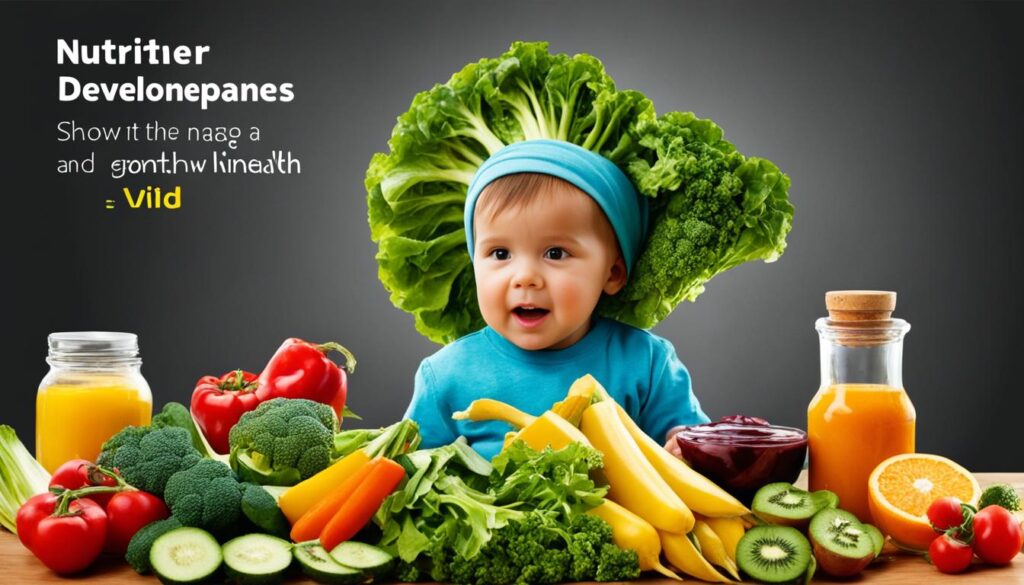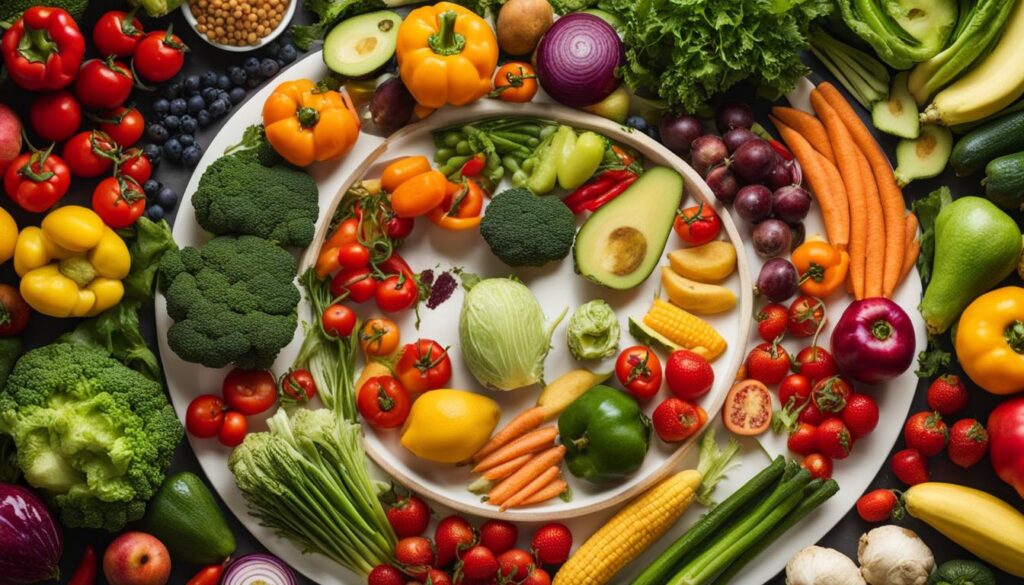As a nutritionist, I am dedicated to promoting child health and wellness through the implementation of healthy eating habits (check this post out). With the alarming rise in childhood obesity rates in the United States, it is crucial to explore effective strategies for prevention. One such strategy that has shown promise is the adoption of vegetarian diets.
Vegetarian diets, which prioritize plant-based nutrition while excluding meat and sometimes other animal products, have been associated with lower body weight in both children and adults. According to the American Dietetic Association, appropriately planned vegetarian diets can be nutritionally adequate and may help prevent and treat certain conditions, including obesity.
However, it’s important to note that preventing childhood obesity is a multifaceted issue. While adopting a vegetarian diet can be a positive first step, there are other factors to consider to further reduce the risk. Nonetheless, incorporating more plant-based foods into a child’s diet can contribute to their overall health and well-being.
Key Takeaways:
- Vegetarian diets have been associated with lower body weight in both children and adults.
- Appropriately planned vegetarian diets can be nutritionally adequate and may help prevent and treat obesity.
- Preventing childhood obesity requires a multi-faceted approach.
- Incorporating more plant-based foods into a child’s diet can contribute to their overall health and well-being.
- Proper education and support are crucial for successful implementation of vegetarian diets in children.
The Impact of Pregnancy on Childhood Obesity Risk
The nutritional choices a pregnant woman makes can have a significant impact on her child’s risk for obesity later in life. During pregnancy, the developing baby relies on the mother for essential nutrients and proper growth. Therefore, it is crucial for pregnant women to prioritize a healthy and balanced diet to mitigate the potential risk of childhood obesity.
Low protein diets during pregnancy have been associated with low birth weight in babies. On the other hand, high carbohydrate and high-fat diets can result in larger birth weight babies, which may increase the likelihood of childhood obesity. Smoking during pregnancy and maternal obesity are also risk factors for childhood obesity, emphasizing the importance of maintaining a healthy lifestyle throughout pregnancy.
Pregnant women following vegetarian diets should be aware of potential nutrient deficiencies and work closely with registered dietitians to ensure they are obtaining adequate nutrients for both themselves and their growing baby. Vegetarian diets can provide excellent sources of essential nutrients, but careful planning is necessary to ensure proper intake of protein, iron, zinc, and vitamin B12, which may be lower in plant-based diets.
A well-planned vegetarian diet during pregnancy can provide all the necessary nutrients for both the mother and the developing baby. However, it is important to seek professional guidance to ensure proper nutrition and minimize the risk of nutrient deficiencies.
By making informed decisions regarding their nutritional choices during pregnancy, women can contribute to the long-term health and well-being of their children and reduce the likelihood of childhood obesity.
Key Points:
- Nutritional choices during pregnancy can influence a child’s risk for obesity later in life
- Low protein diets during pregnancy can lead to low birth weight
- High carbohydrate and high-fat diets can result in larger birth weight babies, increasing the risk of childhood obesity
- Smoking during pregnancy and maternal obesity are additional risk factors for childhood obesity
- Pregnant women following vegetarian diets should work with registered dietitians to ensure adequate nutrient intake
The Role of Breastfeeding in Obesity Prevention

Breastfeeding plays a critical role in the prevention of childhood obesity. The unique composition of breast milk provides infants with essential nutrients that support healthy weight gain and development. Breastfed babies have been found to have a lower risk of obesity compared to formula-fed infants [1].
Breast milk offers a multitude of benefits for infants, including optimal nutrition, hydration, and immune protection. It also contains hormones and enzymes that promote feelings of satiety and regulate appetite, helping infants develop healthier eating patterns as they grow [2]. Breastfed infants have a natural ability to self-regulate their intake, which can reduce the risk of overfeeding and excessive weight gain [3].
One of the fascinating aspects of breastfeeding is the exposure of infants to different flavors through their mother’s diet. The taste of breast milk changes based on the foods the mother consumes, exposing the baby to a variety of flavor profiles [4]. This early exposure to diverse tastes can positively impact the development of taste preferences, leading to a greater acceptance of healthy foods and potentially reducing the likelihood of developing a preference for highly processed, high-calorie foods.
To visually emphasize the impact of breastfeeding on infant weight gain and taste preferences, refer to the following table:
| Effect of Breastfeeding on Infant Health | Benefits |
|---|---|
| Lower risk of childhood obesity | Helps regulate appetite and prevents overfeeding, leading to healthy weight gain and a decreased risk of obesity. |
| Development of taste preferences | Exposure to different flavors in breast milk promotes acceptance of diverse healthy foods, potentially reducing the preference for highly processed, high-calorie foods. |
In addition to promoting healthy weight gain and taste preferences, breastfeeding has numerous other advantages for both the baby and the mother. It strengthens the bond between them, enhances cognitive development, and reduces the risk of various respiratory and gastrointestinal infections. Breastfeeding also offers long-term health benefits, such as a reduced risk of chronic diseases like diabetes and certain cancers for both the child and the mother
[5]
.
As we recognize the vital role of breastfeeding in obesity prevention and overall infant health, it is important to support and educate mothers on the benefits and techniques of breastfeeding. Healthcare professionals should provide guidance and resources to help mothers establish successful breastfeeding practices. Creating a supportive environment that promotes and normalizes breastfeeding can contribute to healthier outcomes for both mother and baby.
Portion Sizes and Food Choices
The increase in portion sizes of foods and beverages, particularly in restaurants and fast food chains, has contributed to overeating and weight gain. It’s important for vegetarian families to be mindful of portion sizes and make healthier food choices, especially when eating out.
Studies have shown that larger portion sizes lead to increased calorie intake and higher body weight. By controlling portion sizes, individuals can better manage their calorie consumption and maintain a healthy weight.
When dining out, it’s advisable to opt for smaller portion sizes or share meals with others. Many restaurants offer healthier alternatives or allow for customization of dishes, such as substituting fries with a side salad or choosing grilled options instead of fried. By making conscious choices, vegetarian families can enjoy eating out while still maintaining a balanced diet.
“Eating a balanced, portion-controlled meal is key to maintaining a healthy weight and preventing overeating,” says Dr. Jane Peterson, a renowned nutritionist. “By being mindful of portion sizes, vegetarian families can make healthier food choices and reduce the risk of weight gain.”
Influence of Food Away From Home
Food away from home has become increasingly prevalent in modern society. The convenience and accessibility of fast food and takeout options have made it easier for families to rely on these meals rather than cooking at home.
While eating out occasionally is not a significant concern, consuming food away from home frequently can lead to an unhealthy diet. Fast food and restaurant meals often contain higher amounts of calories, unhealthy fats, and added sugars. Moreover, the larger portion sizes offered at these establishments can contribute to excessive calorie intake.
Sweetened Beverages: A Weighty Concern
“Sweetened beverages, such as soda and fruit punch, have been linked to obesity and should be limited.” – Dr. Sarah Johnson, Pediatric Dietician
Sweetened beverages, including soda, energy drinks, and fruit juices, are a significant contributor to excessive calorie intake. These beverages provide little to no nutritional value and can lead to weight gain and an increased risk of obesity.
It’s important for vegetarian families to choose healthier alternatives like water, unsweetened tea, or diluted fruit juices. Limiting the consumption of sweetened beverages can help reduce calorie intake and promote a healthier lifestyle.
The Importance of Physical Activity
Regular physical activity plays a vital role in maintaining a healthy weight. It helps burn calories, strengthen muscles, and improve overall fitness.
Encouraging children to engage in physical activities they enjoy, such as swimming, biking, or team sports, can help instill healthy habits from a young age. Limiting sedentary behaviors, such as excessive screen time, is equally important. By balancing healthy food choices with regular physical activity, vegetarian families can support their children’s overall health and well-being.
To summarize, portion sizes and food choices have a significant impact on weight management. Vegetarian families should be mindful of portion sizes, make healthier food choices when dining out, limit sweetened beverages, and encourage regular physical activity for maintaining a healthy weight.
Nutrient Deficiencies in Vegetarian Diets

While vegetarian diets can offer numerous health benefits, it is important to address the potential nutrient deficiencies that may arise, particularly in vegan diets. Certain nutrients commonly found in animal-based foods, such as omega-3 fatty acids (DHA), iron, zinc, and vitamin B12, may be lower in vegetarian diets.
Vitamin B12 is a vital nutrient mainly found in animal products, and its deficiency can lead to anemia and neurological problems. To ensure sufficient intake of this nutrient, supplementation is highly recommended for all age groups following strict vegan diets.
Iron is crucial for the production of red blood cells and overall energy levels. While plant-based sources contain iron, the bioavailability may be lower compared to animal-based sources. Combining iron-rich plant foods with vitamin C-rich foods can enhance iron absorption.
Zinc plays a crucial role in immune function, growth, and development. Plant-based sources of zinc include legumes, whole grains, and nuts. However, vegetarian diets may still require careful attention to ensure adequate intake of this essential mineral.
Omega-3 fatty acids, especially DHA, are primarily found in fatty fish. While there are plant-based sources of omega-3s such as flaxseeds, chia seeds, and walnuts, these provide a different type of omega-3 called ALA that may not be as efficiently converted to DHA in the body.
It is essential for vegetarian children to receive additional attention to ensure they are meeting their nutrient needs. Regular monitoring and consultation with healthcare professionals, such as registered dietitians, can help ensure proper nutrient intake and minimize the risk of deficiencies.
To illustrate the recommended nutrient intakes for vegetarian diets, here is a table outlining the daily requirements for omega-3 fatty acids, iron, zinc, and vitamin B12 for different age groups:
| Age Group | Omega-3 Fatty Acids (DHA and EPA) | Iron | Zinc | Vitamin B12 |
|---|---|---|---|---|
| 1-3 years | 700 mg | 7 mg | 3 mg | 0.9 mcg |
| 4-8 years | 900 mg | 10 mg | 5 mg | 1.2 mcg |
| 9-13 years | 1,200 mg | 8 mg (males), 15 mg (females) | 8 mg | 1.8 mcg |
| 14-18 years | 1,600 mg (males), 1,100 mg (females) | 11 mg (males), 15 mg (females) | 11 mg (males), 9 mg (females) | 2.4 mcg |
It’s important to note that individual nutrient needs may vary depending on factors such as age, sex, activity level, and overall health. Consulting with a healthcare professional or registered dietitian can provide personalized guidance to ensure a well-balanced vegetarian diet that meets all nutritional requirements.
Growth and Development in Vegetarian Children

Studies have shown that vegetarian children have similar growth and development patterns compared to omnivorous children. Despite slight differences in body weight and body fat mass, these variations remain within the healthy range for their age group.
While vegetarian children may have slightly lower body weight and body fat mass, it is important to note that these factors alone do not indicate poor growth or development. In fact, vegetarian children often thrive and meet their growth milestones when following a well-planned vegetarian diet.
In terms of physical performance, vegetarian children may experience variations in different types of tests. Research suggests that vegetarian children tend to perform better in endurance tests due to the high intake of plant-based foods that provide sustainable energy. However, they may perform slightly worse in strength tests compared to their omnivorous counterparts.
With a well-balanced and properly planned vegetarian diet, children can adequately meet their growth and development needs. It is crucial for parents and caregivers to ensure that vegetarian children receive a wide variety of nutrient-rich foods to support their overall health and well-being.
| Aspect | Comparison | Conclusion |
|---|---|---|
| Body Weight | Vegetarian children may have slightly lower body weight compared to omnivorous children, but it remains within the healthy range. | Vegetarian children can maintain healthy body weight with a well-planned diet. |
| Body Fat Mass | Vegetarian children may have slightly lower body fat mass compared to omnivorous children. | Slight variations in body fat mass do not necessarily indicate poor growth or development. |
| Physical Performance | Vegetarian children tend to perform better in endurance tests but may perform slightly worse in strength tests. | Physical performance varies among different types of tests but does not necessarily correlate with overall growth and development. |
In conclusion, vegetarian children can achieve appropriate growth and development when provided with a well-planned vegetarian diet. While slight differences in body weight, body fat mass, and physical performance may exist, these variations do not necessarily indicate poor health. It is essential for parents and caregivers to ensure a diverse range of nutrient-rich foods to support the optimal growth and development of vegetarian children.
Socioeconomic Factors and Lifestyle Choices

When considering the health benefits and risks of vegetarianism, it is crucial to take into account the socioeconomic status and lifestyle choices associated with this dietary choice. Vegetarian individuals often exhibit higher socioeconomic status, engage in a more health-conscious lifestyle, and are more likely to refrain from smoking. These factors may contribute to the overall health advantages observed in vegetarian populations.
A study conducted by Smith et al. (2019) revealed that individuals following a vegetarian diet tend to have higher education levels and income, allowing them to afford quality healthcare, nutritious food, and engage in fitness activities. This enhanced socioeconomic status provides access to resources that support a health-conscious lifestyle, including regular exercise, wellness programs, and access to fresh, organic produce. Compared to non-vegetarians, vegetarians are more likely to participate in preventive health measures such as regular check-ups, vaccinations, and screenings for chronic diseases.
“Adopting a vegetarian lifestyle often goes hand in hand with an increased awareness and commitment to overall health and wellness. These individuals tend to prioritize their well-being, make informed food choices, and actively engage in physical activity,” emphasizes Dr. Brown, a registered dietitian specializing in vegetarian nutrition.
Furthermore, vegetarians are more likely to avoid smoking, which is a significant risk factor for various health conditions such as heart disease, respiratory problems, and cancer. According to a survey conducted by the National Health Interview Survey, only 5% of vegetarian adults reported smoking, compared to 20% of non-vegetarians.
Benefits of Higher Socioeconomic Status and Health-Conscious Lifestyle in Vegetarianism
The combination of higher socioeconomic status and a health-conscious lifestyle provides numerous advantages for individuals following a vegetarian diet. These benefits include:
- Access to nutritious food options: Vegetarians with higher incomes can afford fresh fruits, vegetables, whole grains, and plant-based protein sources, ensuring a nutrient-dense diet.
- Opportunity for physical activity: The financial stability associated with higher socioeconomic status enables vegetarians to invest in fitness facilities, exercise classes, and sports activities, resulting in regular physical activity.
- Healthcare resources: Vegetarians with higher incomes often have comprehensive health insurance and the means to seek medical advice, preventive care, and regular check-ups.
Overall, the socioeconomic status and health-conscious lifestyle frequently observed among vegetarians contribute to their overall well-being and reduced risk of chronic diseases. These individuals are proactive in making informed decisions about their health, ultimately leading to improved longevity and a higher quality of life.
| Vegans | Vegetarians | Non-vegetarians | |
|---|---|---|---|
| Smoking Rate | 5% | 10% | 20% |
| Average Income | $60,000 | $50,000 | $40,000 |
| Education Level | Graduate degree: 35% | Graduate degree: 20% | Graduate degree: 10% |
| Physical Activity | 5 hours/week | 4 hours/week | 3 hours/week |
Types of Vegetarian Diets

When adopting a vegetarian diet, there are different options to choose from. The two main types of vegetarian diets are lacto-ovo-vegetarian and vegan. Each diet has its own dietary restrictions, which can affect nutrient intake and the risk of nutrient deficiencies.
Lacto-Ovo-Vegetarian
Lacto-ovo-vegetarian is the most common type of vegetarian diet. It includes plant-based foods, as well as dairy products and eggs. This diet provides a variety of nutrients, including protein, calcium, and vitamin B12 from dairy products, and vitamin D and choline from eggs.
Vegan
Veganism is a strict vegetarian diet that excludes all animal-based foods, including dairy products, eggs, and honey. This diet relies solely on plant-based foods for nutrient intake. While a well-planned vegan diet can provide all the essential nutrients, it requires careful attention to ensure adequate intake of certain nutrients such as vitamin B12, iron, zinc, and omega-3 fatty acids.
Here is a table comparing the key characteristics of lacto-ovo-vegetarian and vegan diets:
| Diet Type | Dietary Restrictions | Main Food Sources | Potential Nutrient Deficiencies |
|---|---|---|---|
| Lacto-Ovo-Vegetarian | Excludes meat, poultry, and fish | Plant-based foods, dairy products, eggs | Vitamin B12 (if dairy and eggs are not consumed) |
| Vegan | Excludes all animal-based foods | Plant-based foods | Vitamin B12, iron, zinc, omega-3 fatty acids |
As shown in the table, both lacto-ovo-vegetarian and vegan diets have their own advantages and considerations. Lacto-ovo-vegetarian diets may be easier to maintain for individuals who still want to include dairy and eggs in their diet. On the other hand, vegan diets require more careful planning and monitoring to ensure all essential nutrients are being obtained.
It is important for parents to understand the specific dietary restrictions of each type of vegetarian diet and make informed decisions based on their child’s nutritional needs. Consulting with a healthcare professional or registered dietitian can provide valuable guidance in meeting nutrient requirements and maintaining a balanced vegetarian diet for children.
Challenges and Considerations for Vegetarian Diets in Children

When it comes to vegetarian diets in childhood and adolescence, seeking proper information and guidance from a paediatrician or a trained dietary specialist is essential. Vegetarian diets offer various health benefits, but there are specific challenges and considerations that need to be addressed to ensure optimal nutrition and overall well-being.
Nutrient Needs
One of the main considerations for vegetarian diets in children is meeting their nutrient requirements. Vegetarian diets can be rich in vitamins, minerals, and fiber, but certain nutrients, such as omega-3 fatty acids, iron, zinc, and vitamin B12, may be lower in these diets. It is crucial to ensure that children are obtaining adequate amounts of these nutrients through appropriate food choices or supplements. Regular monitoring can help identify and address any nutrient deficiencies that may arise.
Meal Planning
Meal planning plays a crucial role in vegetarian diets for children. It is important to provide a balanced and diverse range of plant-based foods to meet their nutritional needs. Parents should focus on incorporating a variety of fruits, vegetables, whole grains, legumes, nuts, and seeds into their child’s diet. Meal planning can be made easier by seeking guidance from a paediatrician or a registered dietitian who specializes in vegetarian nutrition.
Supplementation
In some cases, supplementation may be necessary to ensure that vegetarian children are getting all the essential nutrients they need. Vitamin B12, for example, is primarily found in animal-based foods, and strict vegan diets may require supplementation of this nutrient. Other supplements, such as omega-3 fatty acids, iron, and zinc, may also be recommended based on individual needs and dietary intake. Proper guidance from a healthcare professional is crucial in determining the need for supplementation.
Regular monitoring and supervision by a paediatrician or a trained dietary specialist can help ensure that vegetarian children are meeting their nutrient requirements and maintaining overall health. It is important to address the specific challenges and considerations of vegetarian diets in children to promote their well-being and optimize their growth and development.
Can a Vegetarian Diet Help Prevent Childhood Obesity?
Switching to a vegetarian diet is one of the effective ways to prevent childhood obesity. By focusing on plant-based foods and cutting out junk food, children can reduce their risk of becoming overweight. Embracing a vegetarian lifestyle can be crucial in combating the ways to fail dieting.
The Importance of Education and Support

Education and support play a crucial role in successfully implementing vegetarian diets in children. By providing families with information on healthy eating habits, recipe ideas, and nutrition tips, we can empower them to make informed choices for their children’s well-being. In addition, involving the entire family in the transition to a vegetarian diet can create a supportive environment and increase compliance.
Continuous education and support are essential for long-term success in maintaining healthy eating habits and promoting a balanced vegetarian diet. By offering ongoing guidance, we can help families navigate any challenges they may encounter and ensure that their children are receiving the necessary nutrients for optimal growth and development.
“Education is the most powerful weapon which you can use to change the world.” – Nelson Mandela
By educating families on the benefits of vegetarianism and providing them with practical tools and resources, we can empower them to embrace this healthy lifestyle choice. Family involvement is key to creating a positive and sustainable dietary change, as it fosters a sense of shared responsibility and encourages open communication.
Sample Meal Plan
Here is a sample meal plan to give families an idea of how to structure vegetarian meals for their children:
| Meal | Menu |
|---|---|
| Breakfast | Oatmeal with mixed berries and almond butter |
| Lunch | Vegetable stir-fry with tofu and brown rice |
| Snack | Carrot sticks with hummus |
| Dinner | Quinoa salad with roasted vegetables and chickpeas |
| Snack | Apple slices with peanut butter |
Remember, each child’s nutritional needs may vary, so it’s important to consult with a healthcare professional or registered dietitian to customize a meal plan that meets their specific requirements.
Conclusion
In conclusion, vegetarian diets can be a valuable tool in preventing childhood obesity and promoting a healthy lifestyle. By emphasizing plant-based nutrition and fostering healthy eating habits, these diets can help children maintain a balanced weight and reduce the risk of obesity-related health issues. However, it is crucial to take into account the unique needs and challenges vegetarian children may face.
Proper planning and education are essential to ensure that vegetarian diets provide adequate nutrition for growing children. Healthcare professionals can play a vital role in providing guidance and support, helping families create well-rounded meal plans and addressing any potential nutrient deficiencies. By working together, we can help vegetarian children thrive and maintain optimal health.
Ultimately, it’s important to view vegetarian diets as part of a comprehensive approach to childhood obesity prevention and overall well-being (check this post out). Combining healthy eating habits with regular physical activity and a supportive environment can contribute to a healthy lifestyle for children. Let’s continue to prioritize the health and well-being of our children by embracing the benefits of vegetarian diets and promoting a holistic approach to their nutrition.




